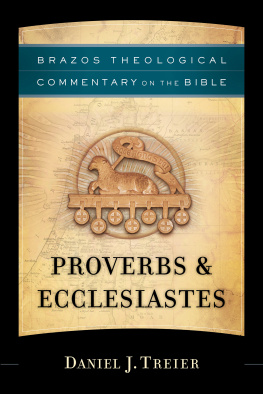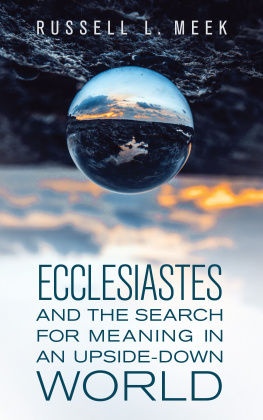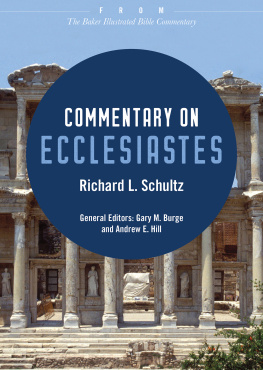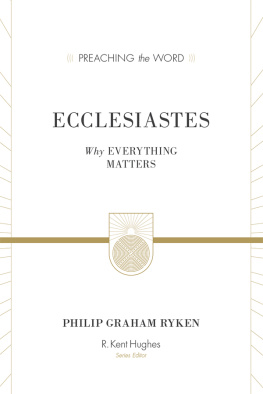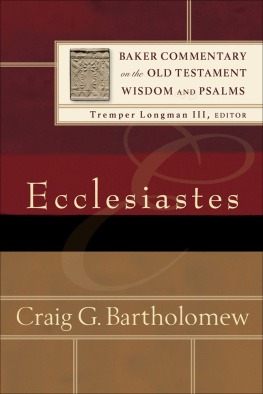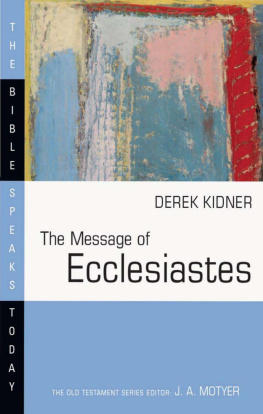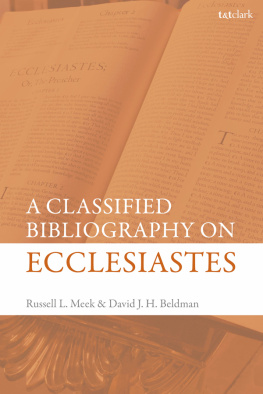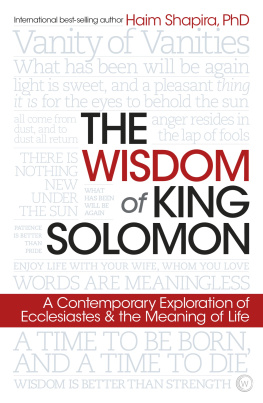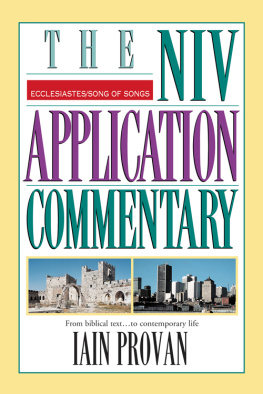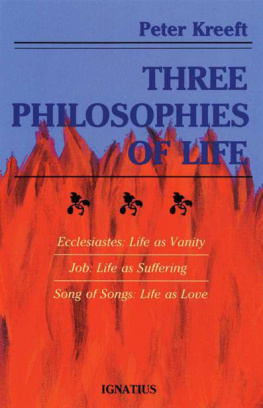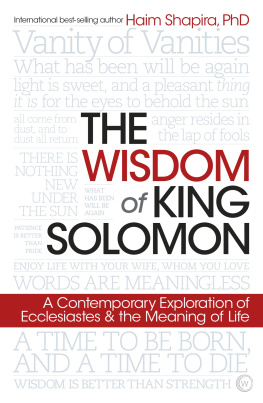Praise for Against the Grain
Welcome to Ecclesiastesone of the most crabby, irksome, beautiful, and challenging books in all of scripture. Wander through Ecclesiastes with Ray Waddle as your guide, and youll discover buried treasure, stunning insight, and spiritual gifts at every turn in the journey.
W ILLIAM H. W ILLIMON
Bishop, Birmingham Episcopal Area,
The United Methodist Church
Author of Remember Who You Are and Sunday Dinner
Ecclesiastes is the most unusual and enigmatic author in the Bible. The result of Ray Waddles musings on the thoughts of this lovable curmudgeon is a book that is both profound and entertaining.
J OHN M C Q UISTON
Author of Always We Begin Again and
A Prayer Book for the Twenty-first Century
AGAINST THE GRAIN
Unconventional Wisdom
from Ecclesiastes
RAY WADDLE

A GAINST THE G RAIN: Unconventional Wisdom from Ecclesiastes
Copyright 2005 by Ray Waddle
All rights reserved.
No part of this book may be reproduced in any manner whatsoever without written permission of the publisher except in brief quotations embodied in critical articles or reviews. For information, write Upper Room Books, 1908 Grand Avenue, Nashville, TN 37212.
The Upper Room Web site: www.upperroom.org
UPPER ROOM, UPPER ROOM BOOKS, and design logos are trademarks owned by The Upper Room, Nashville, Tennessee. All rights reserved.
Unless otherwise indicated, scripture quotations are from the New Revised Standard Version Bible, copyright 1989, Division of Christian Education of the National Council of Churches of Christ in the United States of America. Used by permission. All rights reserved.
At the time of publication, all Web sites referenced in this book were valid. However, due to the fluid nature of the Internet some addresses may have changed or the content may no longer be relevant.
An extension of the copyright page appears on page 160.
Cover design: LeftCoast Design
Cover photo: Martin Baurraud / Gettyimages.com
Interior design: Nancy Terzian / nterdesign.com
First printing: 2005
Library of Congress Cataloging-in-Publication Data
Waddle, Ray, 1956
Against the grain : unconventional wisdom from Ecclesiastes / Ray Waddle.
p. cm.
ISBN 0-8358-9813-X
1. Bible. O. T. EcclesiastesMeditations. I. Title.
BS1475.54.W33 2005
223.806dc22
2004030831
Printed in the United States of America
To my mother
and the memory
of my father
CONTENTS
ACKNOWLEDGMENTS
I owe thanks to all the people whose eyes light up at the name of Ecclesiastes because they discovered him on their own, like buried treasure.
Thanks also to the scholars I cite in this book and to all who face the adventure of reading Ecclesiastes in every generation.
Finally, my loving gratitude goes to Lisa, who makes dreams come true.
PROLOGUE
FEEL THE WIND
This is a book about finding God in the strangest corner of the Biblethe book of Ecclesiastesand why its ignored and what if it werent.
After September 11, 2001, two questions haunt us: Are we safe? and Is God on our side? The issue of God today invades our politics, dreams, and entertainments. This book addresses some common assumptions about God and how Ecclesiastes illuminates them. Or contradicts them. Or points the way to a place of uncommon serenity and wisdom, all gifts of God.
Ecclesiastes is located close to the middle of the Holy Bible itself, in the Hebrew Scriptures, or Old Testament, set between the books of Proverbs and Song of Solomon. Yet this book is usually ignored by organized religion. The author is a moody, enigmatic fellow. Pastors pass over him because he lacks the news of resurrection. Rabbis turn away because his startling outbursts look like a mess of contradiction. Hes considered too disturbing, too pessimistic, for the official version of American spirituality.
But Ecclesiastes is something rare: a poet of emotional honesty and spiritual realism. At first his words are hard to bear. Were accustomed to a different style. Public religion today arrives fast and furious, holy news wrapped in exciting, upbeat production values. People are dazzled, breathless, eager to join, no time for questions. But at the end of the day, the world is still confused, fearful, dissatisfied, angry, violent, forgetful.
Ecclesiastes offers a counterinvitation. Like an ancient stranger riding into town, he comes with candor and courage. He challenges a twenty-first-century idolatrythe careless use of Gods name to bless every self-serving political and religious purpose. Ecclesiastes stands as a rebuke to this breaking of the third commandment, the widespread taking of Gods name in vain, whether to justify political agendas, spiritual hypocrisy, or murderous terrorism.
So this is a book about the neglected themes of Ecclesiastes: the goodness of creation; the fingerprints of providence; the frustrations of spirit in a world of affluence and suffering; the beauty of everyday pleasures; the duty to remember the dead; the duty, indeed, to be happy. Its about feeling the wind in your face, the wind of being alive. Despite his reputation, Ecclesiastes marks the surprising arrival of consolation and hope.
Youll find the entire book of Ecclesiastes enclosed in this book, a little at a time, and one readers attempt at a conversation with it. I wrote this book for three reasons: (1) Im a writer intrigued by how public religion has neglected Ecclesiastes; (2) Im a churchgoer who wants to take the whole Bible seriously; (3) Im a professional observer of the religion scene who thinks Ecclesiastes offers an antidote to the worlds abuses of politicized religion and the deadly use of belief to promote terror, suffering, and injustice.
As a Christian I dont believe Ecclesiastes gets the last word. He doesnt have the whole story. Yet we cant avoid this troublesome, against-the-grain voice from scripture. Christians keep a strange relationship to the Old Testament: we conveniently quote what we like and shun what we dont. But believers should read Ecclesiasteswith alertness, not fear. He teaches and toughens. He tells of the ways of God in a hard world. His writing contains moods of the spiritual lifemoods of Godthat never get publicized in the highly competitive marketplace of religion. He presses readers to work harder to find a balance between praise and remembrancepraise of eternal God and remembrance of everyday sufferingall at once. Hes in the Bible for a reason.
To encounter Ecclesiastes is to argue with him or embrace him but always to feel his shadow across our jittery new century. He arrives just in time, every time.
It is the glory of God to conceal things, but the glory of kings is to search things out.
Proverbs 25:2
[God] has planted eternity in the human heart, but even so, people cannot see the whole scope of Gods work from beginning to end.
Ecclesiastes 3:11, NLT
All scripture is inspired by God and is useful for teaching, for reproof, for correction, and for training in righteousness, so that everyone who belongs to God may be proficient, equipped for every good work.
2 Timothy 3:16-17
INTRODUCTION
ECCLESIASTES AND US
I was still a teenager when I first encountered Ecclesiastes. I never got over the shock.
It arrived as a quote at the beginning of a Hemingway novel, The Sun Also Rises, a story of disillusioned wanderers in postWorld War I Europe. Its Hemingways best book.
But the quote stopped me cold. It sounded exhausted, discouragedthe way a real person actually feels sometimes. As a churchgoing teenager, I was flabbergasted. Here was a statement in holy scripture announcing the opposite of Sunday school uplift. It read:
Next page

